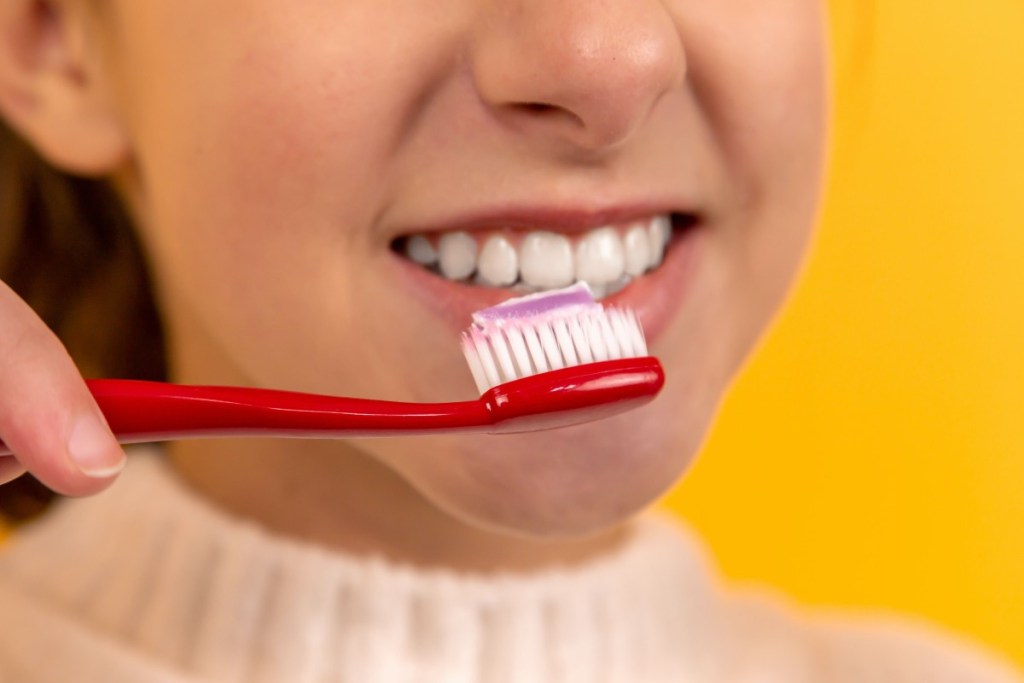Smiling big and often is linked to a longer, healthier life, one study showed. It’s the feeling behind the grin that matters most, but there’s nothing wrong with wanting to flash truly pearly whites. What’s more, oral health may boost your overall well-being. The American Dental Association says having poor dental health is linked with heart disease and stroke.
You likely know the basic building blocks of having a healthy mouth: Brush and floss twice per day, and see your dentist for regular cleanings. Mouthwash also helps. All these methods are tried and true, but there are other, lesser-known tips for oral health worth considering. Your teeth and gums will thank you for adding these elements to your lifestyle.

Foods to eat for healthy teeth and gums
Your teeth and gums play an essential role in the digestion process. Make it worth their while by munching on foods that are good for them, like these:
Fruits and veggies
Fruits and vegetables high in fiber and water content, such as apples and broccoli, can help clean teeth and gums by getting your saliva flowing. Though brushing is important, saliva is like a natural cleaner. Approximately 20 minutes after you eat sugary or starchy foods, your saliva gets to work protecting your teeth against the acids and enzymes trying to attack them.
Calcium-rich food and drinks
Dairy products, such as yogurts and cheese, contain calcium. Eating them helps to restore any calcium stripped from your teeth while you ate. It also boosts enamel.
Nuts
Nuts, like almonds and walnuts, are packed with vitamins and minerals that your whole mouth will love, not just your taste buds. Almonds, in particular, are known to have calcium, and walnuts have fiber and iron.
Foods to eat in moderation to keep teeth and gums healthy
You don’t necessarily have to nix anything from your menu, but not all foods are great for oral health.
Sugary foods
It likely comes as no surprise that sugary foods can cause decay and one of the more common tips for healthy teeth and gums involves limiting your intake of them.
Foods that get stuck easily
Starchy foods like potato chips and bread commonly get stuck to the top of your mouth and can irritate the gums and teeth. Other foods, like popcorn, also can get caught between teeth. Try to brush or floss soon after eating these foods to mitigate issues.
Acidic foods
While fruits have their share of benefits, highly acidic ones like oranges can wear down enamel. (Coffee and alcohol also fit this bill — sorry.) Try to reach for others, like apples, more frequently.

Brush right
Brushing is important, but the ADA says there are best practices to follow to keep your mouth in tip-top shape. Follow these expert tips for healthy teeth and gums.
- Start by holding your toothbrush on your gums at a 45-degree angle.
- Move it back and forth using gentle, tooth-wide strokes.
- Brush the entire tooth — outer and inner surfaces and the surface you use to chew.
- Tilt the brush, so it’s vertical. Move it up and down multiple times to give the inside surfaces of your front teeth some extra cleaning.
Do this twice per day for two minutes.
Stress less
You likely know stress can reduce your physical and mental well-being. There’s not much evidence to support the idea that stress and periodontal disease are definitively linked. However, one 2013 report suggested that there may be a connection between psychosocial factors and inflammatory periodontal diseases. The authors said stress might be a risk factor for periodontal disease, though more research is needed. Stress is never fun. If you’re stressed, you may not eat as well or brush your teeth correctly, and it can affect your teeth. Try to manage your stress by exercising, talking to a therapist, or whatever works for you.
Having good oral health can help boost your confidence when you smile and potentially reduce your risk of other issues, like heart disease or stroke. Brushing, flossing, and being on a first-name basis with your dentist are common tips for oral health, and they are essential. However, there are others to keep in mind. For example, what you put into your mouth during mealtime matters. Try consuming dairy products and fiber-rich produce and limit sugary and acidic foods and drinks, including coffee and alcohol. Follow the ADA’s steps when brushing your teeth at least twice per day. Also, if you need one more reason for self-care: Stress levels and dental health may be intertwined. Take some time to yourself to chill out. Your smile will be bigger and healthier because of it.
BlissMark provides information regarding health, wellness, and beauty. The information within this article is not intended to be medical advice. Before starting any diet or exercise routine, consult your physician. If you don’t have a primary care physician, the United States Health & Human Services department has a free online tool that can help you locate a clinic in your area. We are not medical professionals, have not verified or vetted any programs, and in no way intend our content to be anything more than informative and inspiring.



